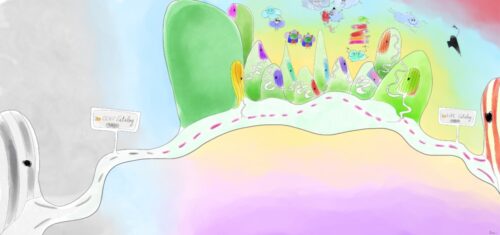We All Know This Story, and Yet…
By Matt Reed
Originally published in Inside Higher Ed
If you haven’t seen the piece by Jen Balderama in The Washington Post this week, I recommend it. It’s an autobiographical account of how the City College of San Francisco, a community college, saved her from drifting and put her on the path to a successful career. (She’s currently an editor at The Washington Post, having previously been one at The New York Review of Books.)
The kicker, which she is gracious enough to imply without saying, is that she didn’t graduate. In current “accountability” or “performance-based” metrics, she’d count as a dropout. She’d be a statistic held against the college that, by her own account, changed her life for the better. The college would be punished for the outcome she celebrates.
We all know students like her. They didn’t graduate, or they didn’t graduate within the allotted time, but they look back with gratitude on their time in community college. It provided stability, safety and hope at a time when none of those could be taken for granted.
The secret ingredient, I think, is respect. Students who show up at community colleges have frequently been kicked around in other places. They’ve had checkered high school experiences, or difficult family circumstances, or maybe they’ve been working low-wage jobs for years. Highly rejective colleges often wouldn’t look at them, and for-profits would try to fleece them. Maybe they have complicated family lives. Maybe they just haven’t figured out what they want to do yet.

At their best, community colleges meet students where they are and help them discover much more. And they do it without passing judgment on the paths that brought students there.
Parts of Balderama’s piece feel like artifacts from a time capsule. She mentions tuition of $13 per credit, which is no longer true even in California. (California has long had some of the lowest tuition in the country.) Decades of disinvestment have forced tuition higher, to students’ detriment. She also mentions the late, lamented paper catalog. Paper catalogs have largely been replaced by online course listings. That makes sense in a few obvious ways — it saves printing and postage costs, and it’s much easier to update online listings in real time — but there’s something to be said for poring over a paper catalog at one’s leisure. I have to wonder if we lost something when we made the shift.
I had to smile a bit wistfully at the mention of a counselor who told her to take her time. That’s the opposite of the advice we’re supposed to give now. Now, it’s all about identifying a goal early and avoiding any “unnecessary” classes. That’s understandable, given how much more expensive the world is now, but sometimes it’s those oddball diversions that generate unexpected sparks.
Given decades of disinvestment and an increasingly polarized political economy, community colleges have had to become much more efficient, which is good and bad. Efficiency is great when the goal is clear: for example, new LED lighting is both cheaper and lower-maintenance than the previous generation of lighting, and it’s just as bright. That kind of efficiency is a pure gain. But efficiency in reducing exploration is more of a mixed result. More students finish, which is good. Possibly fewer have those positive surprises that Balderama notes changed her life. That’s less good.
Still, the core of her story remains true. Retention and graduation matter, but reducing a college’s performance to those numbers erases stories like hers. Stories like hers are why we do what we do. She’s a successful journalist with a national profile; CCSF shouldn’t be punished for that.
In a more egalitarian economy, one might object, it would be reasonable to take a more holistic view of student success, but this is economic war: man the battle stations! And there’s some truth in that. Ultimately, colleges exist in a much larger society over which they have little control, and to which they need to adapt. But stories like hers should remind us not to cut down the future to the size of the present. Education is inherently idealistic; by definition, it puts faith in what has not yet been seen. If we lose sight of that, we will have lost something crucial. I don’t want to shortchange the next Jen Balderama.
